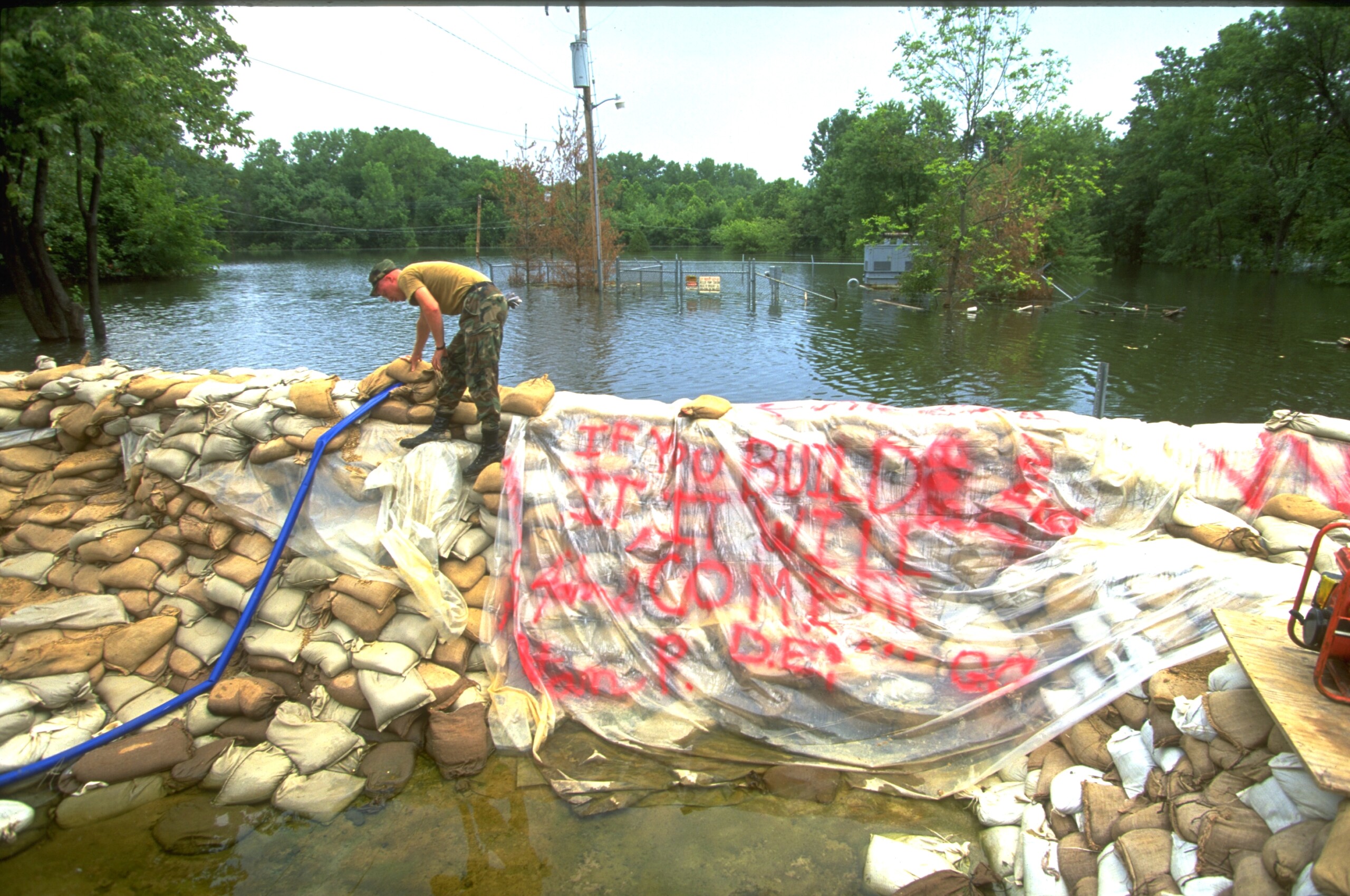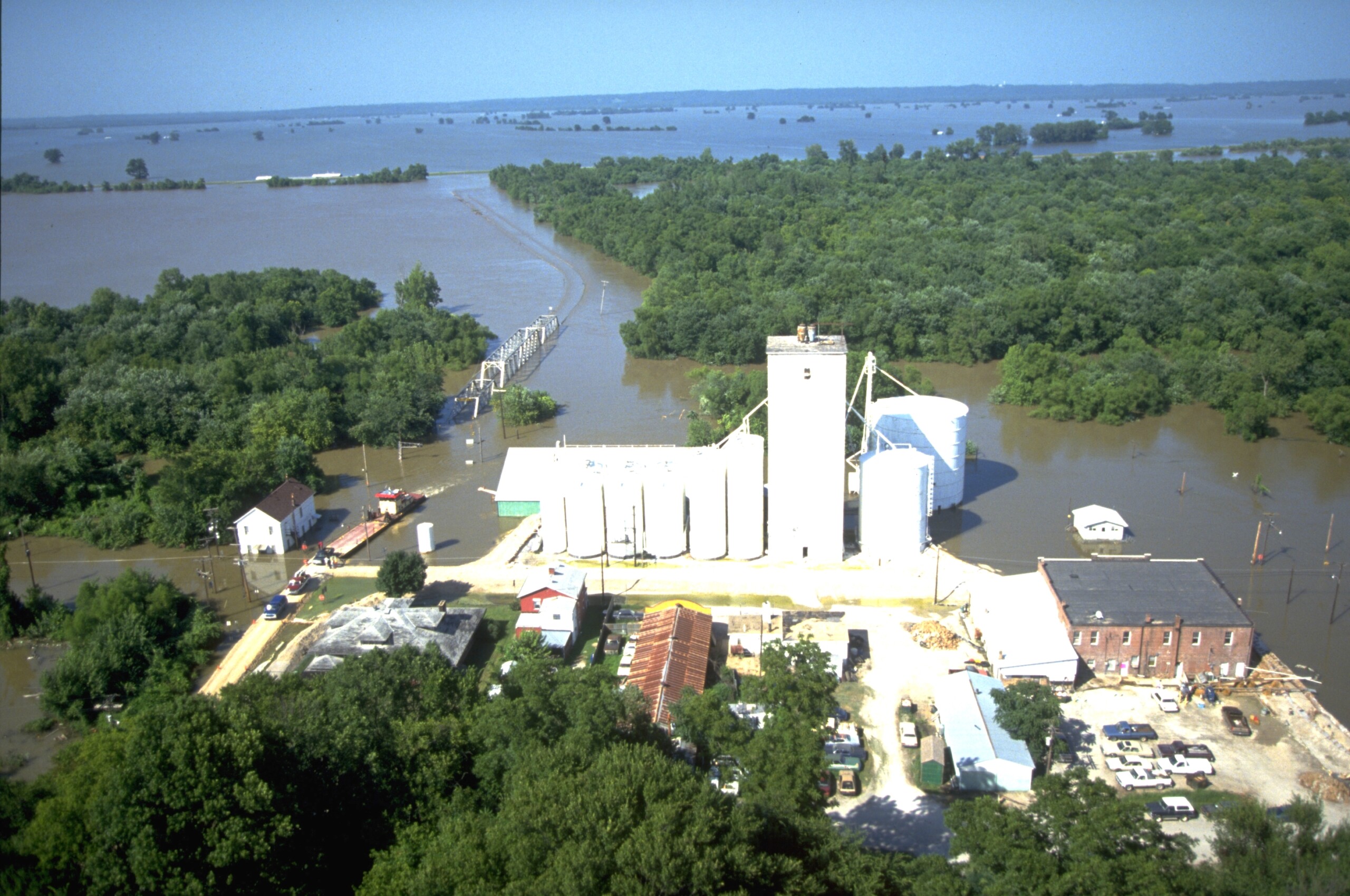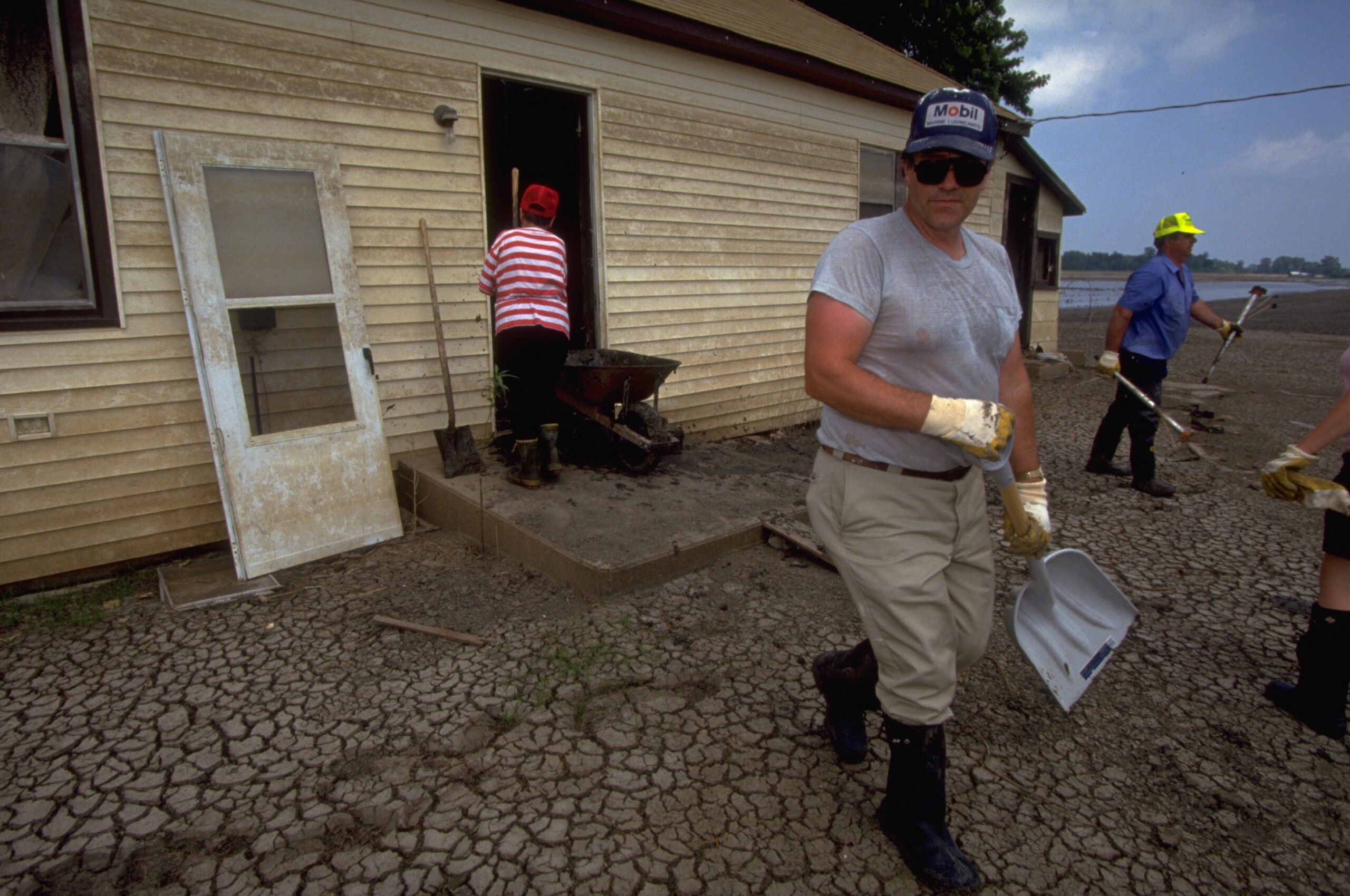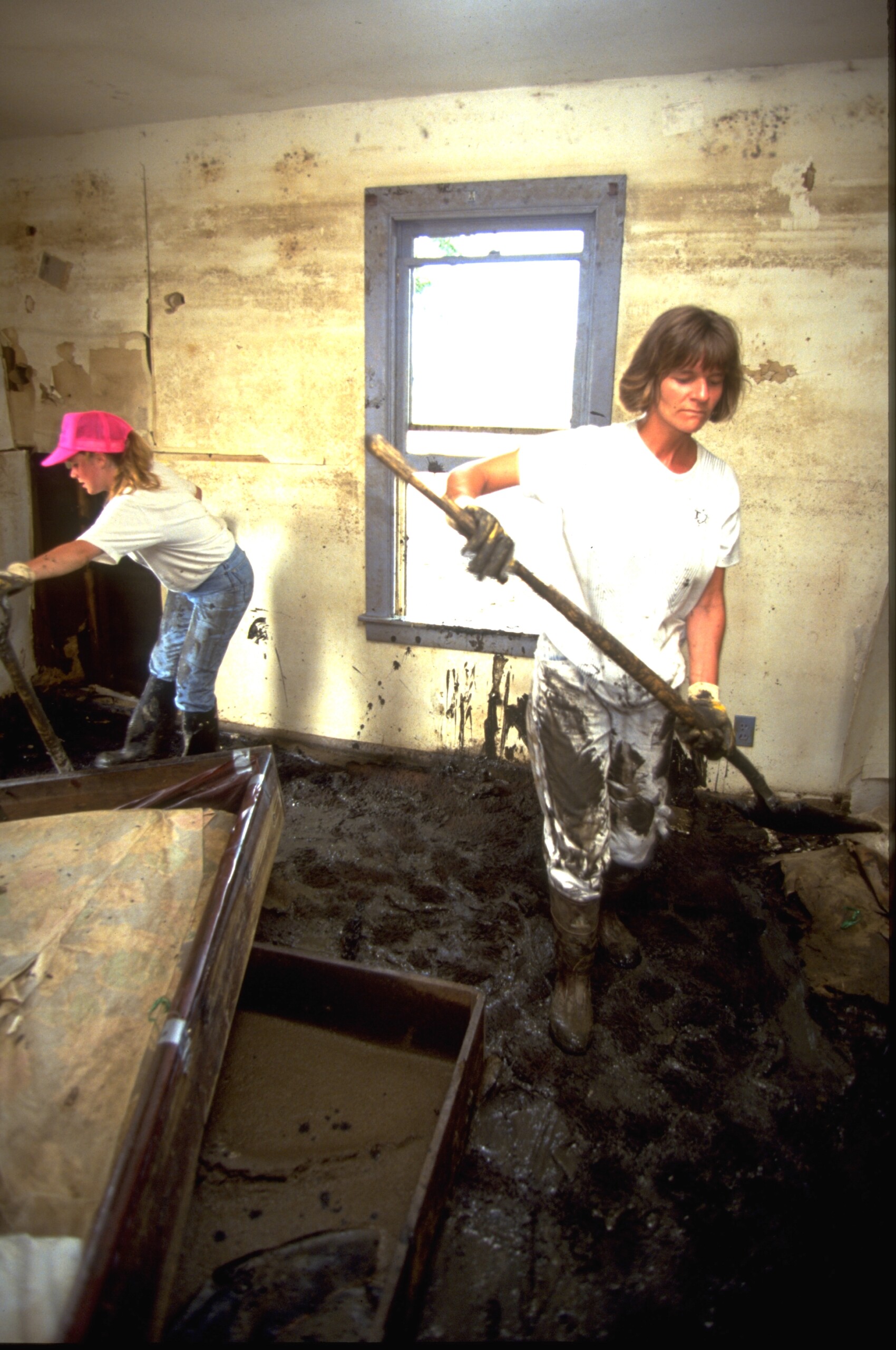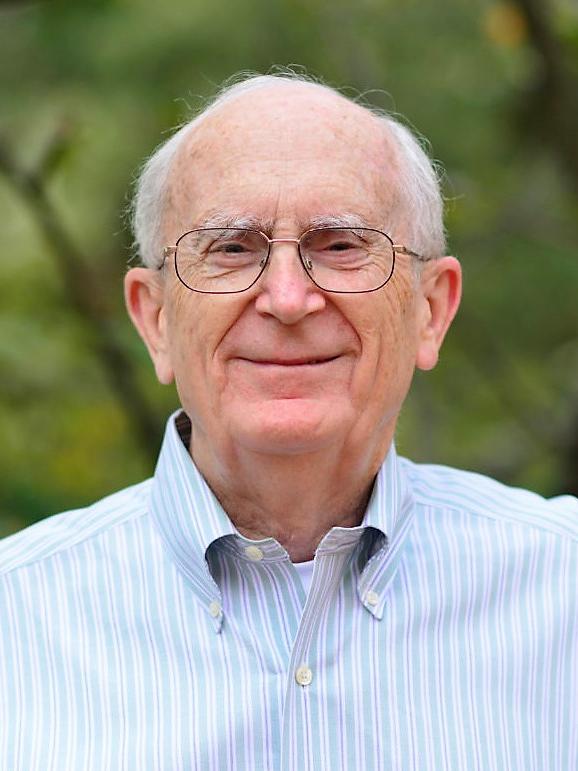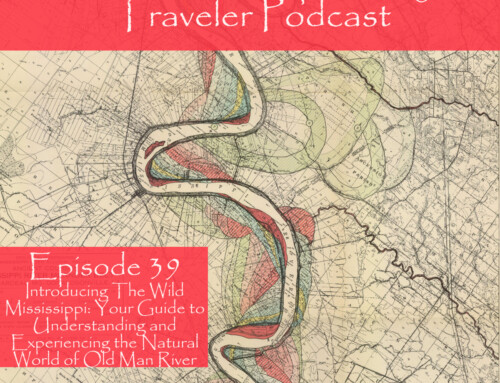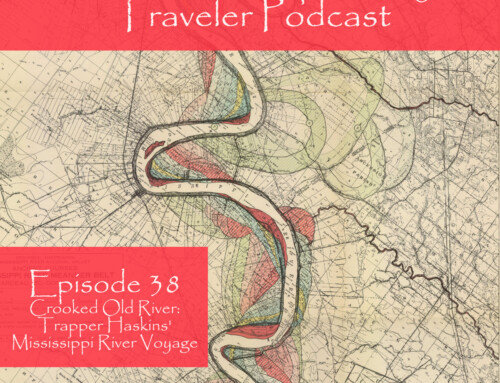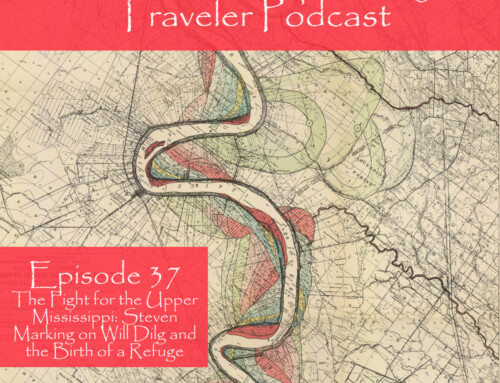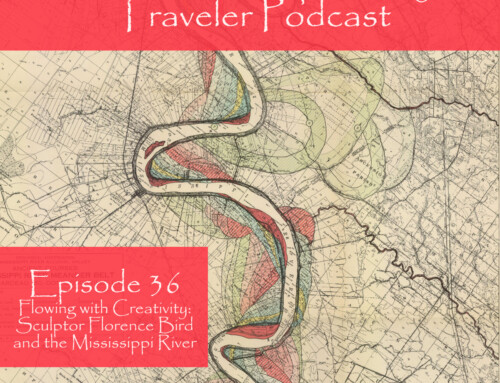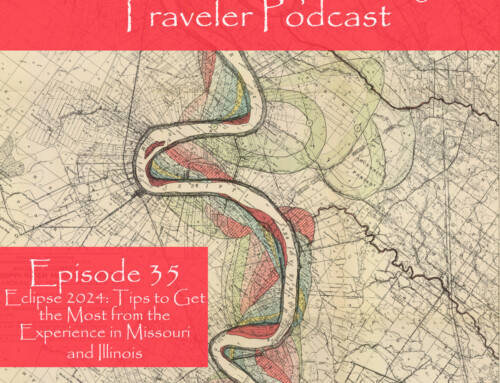Welcome back! Last week, I shared the first part of my conversation with General Gerry Galloway, the person chosen by President Clinton to lead a review what happened in 1993 and what could be done to prevent such extensive damage in the future. Because our discussion ran long, I split it into two episodes. Check out the previous episode to hear the first half of our conversation, as well as a summary of the events of the 1993 flood. In this episode, our discussion turns to talking about how we define and count costs and benefits for river projects, and how those analyses have slowly moved beyond simple mathematical formulas. We also talk about the difficulties with trying to assign dollar values to many of the benefits, including environmental benefits. We touch on issues related to who has a voice in determining river management policies, as well as what values our policy choices reflect. We end by talking about the idea of sustainable infrastructure, one of General Galloway’s primary interests. In the Mississippi Minute, I have a few thoughts about how federalizing projects blurs the lines between people who merely have an interest and those who have a stake.
Show Notes
Support the Show
If you are enjoying the podcast, please consider showing your support by making a one-time contribution or by supporting as a regular contributor through Patreon. Every dollar you contribute makes it possible for me to continue sharing stories about America’s Greatest River.
Don’t want to deal with Patreon? No worries. You can show some love by buying me a coffee (which I drink a lot of!). Just click on the link below.
Transcript
SUMMARY KEYWORDS
people, mississippi, levee, dams, project, benefits, flood, river, mississippi river, corps, issue, cost, flooding, money, figure, happened, mississippi valley, build, basin, moving
SPEAKERS
General Gerry Galloway, Dean Klinkenberg
General Gerry Galloway 00:00
We don’t want to pay for what we want to get. And if you want to have a better flood control, then you better figure out how you’re going to pay for it. And recognize that if you’re going to live at risk, you’re going to have to pay for it. On the other hand, if you’ve got a substantial portion of the population, and you put them there, by redlining and doing other things, you’re creating a problem that they can’t handle and you’re gonna have to help them out with.
Dean Klinkenberg 00:51
Welcome to the Mississippi Valley Traveler Podcast. I’m Dean Klinkenberg and I’ve been exploring the deep history and rich culture of the people in places along America’s greatest river, the Mississippi since 2007. Join me as I go deep into the characters and places along the river, and occasionally wander into other stories from the Midwest and other rivers. Read the episode show notes and get more information on the Mississippi at MississippiValleyTraveler.com. Let’s get going.
Dean Klinkenberg 01:23
Welcome to Episode 26, of the Mississippi Valley Traveler Podcast. In this episode, we will listen to part two of my interview with General Gerry Galloway, who was the head of the Presidential Commission that looked back at the 1993 flood and tried to figure out what went wrong and what we could do better going forward. My interview, both parts focus more on how we’ve done in the past 30 years and what we can do a little better looking forward. In the second part of the interview, we talk a little bit more deeply, we geek out a little bit about the issue of cost benefit analyses, what counts as costs and what counts as benefits and the difficulties we have in defining those. We also talk about some of the struggles with how to value environmental benefits and the attempts in the past to assign a dollar value to some environmental benefits. We talked a little bit about the values represented in the infrastructure and the projects we choose to take long, especially along the Mississippi, and who has a voice in setting the policies about river management. General Galloway specializes in sustainable infrastructure. That’s one of his interests. So we talk a little bit about what exactly that means to him. And we ended up circling back around again to the idea of who really should be paying for all this. I think this is an interesting interview. It’s an interesting conversation, he has a lot to say. And I hope you’ll take the time to listen to both parts, you can listen to them independently. But if you haven’t listened to part one, I would recommend going back to that first because that has a quick little summary at the beginning of what happened in 1993. In case you forgot what happened 30 years ago. Check out the show notes for a few pictures of floods from 1993, as well as the link to the original Galloway Report. So thanks to those of you who show me some love through Patreon. As always, I’m very grateful for your ongoing support. It helps keep this podcast rolling along. If you want to know how to join the community, go to patreon.com/DeanKlinkenberg. Or if you want to just you know help me support my caffeine habit, go to MississippiValleyTraveler.com/podcast where you can buy me a coffee. And now here’s part two of the interview with General Gerry Galloway.
Dean Klinkenberg 03:57
So I’m going to come back to something you mentioned a little bit ago too, when you were talking about the government isn’t required but can intervene. The federal government can intervene when the benefit of say a structural solution outweighs the costs of that. Can you talk a little bit about like, what factors into deciding what’s the benefit and what’s the cost in that formula?
04:20
That’s a wonderful question. In 1936 we started all this flooding business and building dams and and people have said benefits exceed the cost. Get your notebook out and your calculator if you had a calculator, your abacus and figure it out. By 1960 there were people in the Congress that were really upset about it, including a young man named Kennedy, that we were forgetting about the environment, we’re forgetting about the people and that the benefits should include the people and so in ’65 they passed an Act that said come up with some goals and standards that define what this should be. And they came up with national economic development, regional economic development, other social effects and environment. And look at those four piles and compare them to each other. And if the cross leveled benefits exceeded the cross level costs, go ahead with it. Well, in ’81, when we did away with the Water Resource Council, we also got rid of essentially everything but the national economic development, OMB, the Office of Management Budget, and a guy named James Watt, who was the Secretary of the Interior says nonsense, we want to go ahead with the dollar. And that’s been a fight ever since. New administrations have come in and tried to make it better. And it is gone back and forth. In 2007, the Congress directed, essentially we go back to the what was done in ’65 and have these four different accounts. What happened is, it’s so amazing, the administration, President Obama, came up with the plan, submitted the Congress, and then Congress passed it and said, “Oh, this is good. It went into law and said, thank you for doing this. This is very good. Oh, but oh, by the way the Corps of Engineers, you’re the largest group that does this, you can’t use that. We don’t like it.” Now, they just told him to do it. But they said you. And so in 2020, the Water Resource Development Act said to The Corps of Engineers and administration, you will do it. And you’ve got one year to do it. And nothing has happened. or very little has happened. President Biden came in and said, We want to worry about the environment. And he has been and and I think administrations have moved slowly to taking care of the environment. More and more, we said that in the ’93 report, you’ve got to take care of the environment. There’s lots of reasons for it, including reducing the flood impacts like the coast of Louisiana and, and places in Missouri and other places where you can store water. So you want to do that. What we left out was the social, President Biden came in and said, We’re not going to do that any longer. We’re going to be worried about that. He’s got an initiative called Justice 40 that says 40% of the funds going towards climate and energy programs will go to people that are in underserved communities are underrepresented. We know there’s a problem. We know that in communities that are subject to flooding, the lifespan is considerably less than for people who live in the floodplain than those who live outside the floodplain. And so in this particular case, there was no legislation, the President just said do it. And and so what we, in trying to get this balance, you need somebody at the state level, or the local level, or at the federal level, who just says, “Do it. Don’t just stand there, do it”. And we’re now again, as complicated as this, we just saw the Supreme Court say that executive branches can’t make law, they ought not to have their agencies write rules that give 40% of the money to this. You can’t do it that way. So a lot of these things are not as simple to solve as people would like to think they are. But very clearly the nation is moving towards the balance of the four. Regional economic development is one that people argued about. Why should I pay to give a discount to the people in New York that are moving out of a rust belt factory and moving into Mississippi? Why should I let Mississippi make money on that? With the Fed? Why should the federal government, if Mississippi wants to pay that’s fine. And so we’re still arguing about some of these things.
Dean Klinkenberg 08:52
Right. And I remember, oh, gosh this is an issue that’s come up periodically over the past 40 or 50 years. There was a proposal – The Corps would like to build a levee enclosure at the St. John’s Bayou along St. John’s Bayou, south of St. Louis. And, as I recall, part of the justification was the economic ROI on this project was positive. That it showed a positive economic impact, the Corps spending tens of millions of dollars to build an additional few feet of additional levee. But when I looked at the benefits, it looked like it was mostly in terms of increased value of the farmland. It was maybe an increased production because there are a few more years when they be able to get crops out of the land that floods periodically now. These are benefits that would accrue almost exclusively to a small number of people along the part of the St. John’s Bayou that floods occasionally. And I couldn’t help but wonder why that would be a federal priority.
09:57
Well, that’s something that Congress has to decide. Now, I would, after spending seven years on the Mississippi River Commission, I would argue that there are environmental benefits to a properly developed project at the southern end of the St. John’s Bayou. And again, it’s the whole idea of using the New Madrid floodway. What are you…where are the benefits there? It is a challenge to figure out how you do that and where the benefits lie. And who gets the benefits if it’s totally environmental. The Everglades, we’re spending literally billions of dollars to restore the Everglades that have very little well, there’s economic recreation benefits from the that but it’s not on the order of building huge plants and things like that. So it’s a question of what are our national goals and objectives? And how do we specify them. But Senator Byrd, the late Senator Byrd of West Virginia had some communities in the Tug Fork Valley. And they flooded all the time. And there the benefit, the return on investment for the protection of these people was something like 0.5 in terms of economic terms. And he said, you all didn’t read the 1936 Act my friends. It says benefits across. It didn’t say economic benefits. If the benefits, the Big B exceed the costs and my constituents are going to have a better life. And that goes back to the social equity. If, in fact, people can’t rise out of their poverty because they’re flooding it’s a problem. There’s a community in West Virginia now that can’t get flood protection because the system that OMB uses is still chartered to deal with the economic benefits. And the fact that people can go to school, they don’t have to drive 30 miles to school, that the families will have jobs, all of these things. The Biden’s plan is you take these things into account. But up until this point in time it has been difficult to convince the Office of Management and Budget that that’s a good idea.
Dean Klinkenberg 12:11
Right. And there’s a similar issue south from St. Louis again. There was a hole punched in the levee on the Illinois side around Miller City that has not been plugged since I think it was the 2016 flood. I could be wrong on that. And from what I remember, the justification was that the Corps determined that the amount of money they would spend to fix that hole in the levee didn’t justify the economic benefits of fixing the hole, so they weren’t going to do the work. Are you aware that case Sir?
12:43
I’m not familiar with the case, but it would not surprise me at all. I mean, you live across from East St. Louis. And the challenge is, is how do we really make the East St. Louis levee…have it be…the integrity be so sound that it will guarantee to protect those people? And again, people say, well, it’s not there’s not that much of a flood. No, there’s a lot of people there. And you have to take that into account.
Dean Klinkenberg 13:10
Absolutely. So the the other part about this too, and you sort of alluded to, I remember, I think it was in 2019. I went to the Mississippi River Commission’s High Water meeting. And at that meeting, there was a brief discussion about environmental restoration programs, and one of the commission members said very directly that we have a very hard time figuring out how to value those kinds of programs. So what are your thoughts on that? Like, how do we try to…what are we doing these days to try to assign value to that as we look at this whole big picture of the cost benefit formulas?
General Gerry Galloway 13:51
Well, for the last 35 years I’ve been teaching water resource management as I’ve done other jobs on the side or vice versa. And I teach students that issue. I say to them, okay, how do you buy your car? You know, you write down on an envelope the things that are going to influence you to buy your car. Is it the color, the speed? Why do you do that? Is it who you can pick up on as you drive through the city with it? All of these factors. Now put them in terms of cost, and you get cost over here? And I said, here’s here’s the cheapest car and very efficient does all this. It’s really ugly. And inevitably they’ll say, well I would never buy that. Because they were taking other factors into account. And in my point on all of this is the nation can’t go and demand that I put a value on the date attractiveness of my car. That I could say, oh, that’s worth $4,500 to be able to drive through and have everybody want to ride with me. But that’s what we’ve tried to do. And we’ve been doing it ever since, oh, the ’70s when we got into the whole business of the National Environmental Policy Act. We’ve, people have said, let’s figure out what the value is. We figured out somewhat the value of recreation. What does the recreation day mean? It means, in terms, you’re going to buy a certain amount of gas for the motorboat. You’re going to have the boat. You’re going to buy a certain number of meals. So every visitor is a certain return on investment. But that doesn’t help with everything. You have a picture behind you of a beautiful area in Louisiana. What’s that worth? What’s it worth to be able to take kids from underprivileged community out on in the marshes of coastal Pennsylvania? In Philadelphia? How do you deal with that? Well, my answer is we deal with that in the rest of our lives. I am a fan of a man named Ian McHarg, who was a Scot British planner who came to the United States and changed the way we did plenty. GIS, in my view is largely being used because of Ian McHarg. He said, you’ve got to figure out what’s important to you and put it down. You give it a weight. You don’t have to get dollar value value on it. You give it a weight, you say it’s it, I’ve got it…That’s what President Biden just said with the Justice 40. Guys listen to me, 40% of the money is going to go to justice for people who are in underrepresented areas. And I’m the president, if you don’t like it, fire me. I read the tea leaves to say that it’s the total of the benefits and the benefits if I can’t calculate them, I can still say there’s a value to them. And it’s so high. And you do that every day in your life. Why should that be any different? I mean, why are we sending what arms we are to the Ukraine? Why are we equipping forces? Why are we putting up sound walls on the sides of highways?
Dean Klinkenberg 17:12
Right. So you’re just talking essentially about values. Like what values do we want to reflect? When we’re doing x, y or z? And when it comes to the way we manage the Mississippi today, what do you think? What does our current management of the Mississippi say about what we value?
General Gerry Galloway 17:33
Well, that’s a good question. I, I obviously have a prejudice because I think the Mississippi River Commission works very hard, certainly in the Lower Mississippi Valley, to balance off environment and public use and anti-pollution deal with navigation and flood control. All of those things, I think we need to balance. Who decides this? It’s not the simple scale that justice holds up where there’s one side versus the other. It’s got all sorts of scales on it. We’ve been doing studies. I’ve been part of studies that use sort of future vision, shared vision planning, where you think of what the future should be and all the things that have to be taken into account. And you, you figure out what it is that’s important to you. And I’ll give you a quick example. We were working, the study team was working, on the St. Lawrence River and they learned that there was a dam, a big dam, and it produced a lot of power. And the power then was cheap. And people could work in a factory. But having a water hill there might hurt the fish. So the question was, if you release more water, you raise the price of the electricity that you’re selling to the factories? And people lost their jobs. So as you turn the rheostat, what were you balancing? What were you giving up? And and people who are dead set against releasing any or not holding water, realized that if they didn’t hold the water, they were going to impact their neighbor who would lose his job. And so that took a different spin when you can see the trickle across the entire plane of what the benefits would be. That goes for the Mississippi, we have a wonderful inland navigation system. Is it worth it? Well, as you go north, you go up to St. Paul, you go through 26 locks and dams, and you go through these lakes, and they are disrupting in some way the natural system. On the other hand, I guarantee you that if you were to say take out all the locks and dams and we’ll have free flowing water, you would have a massacre of all the people coming down with their boats to get the people that would try and do that. Because everybody loves that flat water that you have on the Mississippi. And so how do you balance…and they’re environmentalist. I’m a hunter, they’ll say. I love to hunt and fish and I’m sorry that this species we had to lose because it didn’t have the habitat. How do you, that’s the most interesting part. We discovered the St. Lawrence there were fights among people who want a different species of plants. So how do you deal with that?
Dean Klinkenberg 20:25
Right. Well, yeah, fundamentally the more we manage, the more we pick winners and losers and all this too, though, right? And maybe that’s just an unavoidable consequence of being human and living in this world. But the more we try to control, the more we’re making decisions about winners and losers.
General Gerry Galloway 20:42
Well, I think you’re absolutely right that it is. The more we get into this, if we just say nature take over, but we can’t let nature take over. And Mississippi is magnificent. And what do you do with it? How do you control it? Is it good to have locks and dams? Well, now it is because we’ve, since the ’30s, we’ve had them there and people have grown up used to that. And imagine what that would do to real estate values and other things if you were to lose all that. And if you were to lose the the traffic that you have on the river. Would I say the same thing for the Missouri? I’m not sure. But again, that’s what people have to decide.
Dean Klinkenberg 21:26
Hey, Dean Klinkenberg here, interrupting myself. Just wanted to remind you that if you’d like to know more about the Mississippi River, check out my books. I write the Mississippi Valley Traveler Guide Books for people who want to get to know the river better. I also write the Frank Dodge mystery series set in certain places along the Mississippi. Read those books to find out how many different ways my protagonist Frank Dodge can get into trouble. My newest book, “Mississippi River Mayhem” details some of the disasters and tragedies that happened along Old Man River. Find any of them wherever books are sold.
Dean Klinkenberg 22:01
So when it comes to managing the river, and we mentioned the Mississippi River Commission, which, as I recall, they’re all presidential appointees. Correct. You’re, and it’s all by law, they’re all engineers as well, right?
General Gerry Galloway 22:18
I think there’s one that doesn’t have to be an engineer. The Coastal Geodetic Survey person is not, which is now NOAA.
Dean Klinkenberg 22:29
So you mentioned before, you know, the difficulty with trying to figure out how to incorporate things like the value of having kids from a city neighborhood out in the coastal wetlands or coastal marshes. Some of these issues that are harder to quantify dollar value for. So when it comes to, you know, to managing the Mississippi, who are the voices that are representing or looking out for those kinds of values for the river, then?
General Gerry Galloway 22:59
An awful lot of people and that’s another problem. Who is the public? Who represents that world? After the 1927 flood, the mayor of Chicago, the mayor of St. Louis, the mayor of the cities along the river, got together and put pressure on the Congress to do something about the flooding on the Mississippi River. You could not stand another national disaster like that. We have groups that have worked on the Missouri, excuse me the Mississippi Basin, to identify what are the goals and objectives that happened after Katrina. They started to figure out, let’s get some specified goals. But you have so many actors, and actors become I guess creatures of their upbringing. They’re creatures of the organization that’s supporting them. And you have the Audubon Society fighting with the Sierra Club, fighting with the barge industry, fighting with the corn growers. All of these people have a stake but it’s not exactly the same stake. And so that’s the challenge, is to make sure that people are represented. And I’ve got to tell you, honestly, in the many years, the 60 years that I’ve been doing this that I’m not always happy but I do recognize that the Congress is a representation of our country, and that you all pick good people. I’ve known the people in the state of Missouri and in the Mississippi Basin. Congressman. And I’ve highly respected some, not so much others, but they in many cases are representing the people who live on their land and who am I to say?….I did a study in 1973 on what the nation thought about the Corps of Engineers and who should be making decisions. I got one response from a national organization. I won’t tell you what kind of an organization, and said decisions about what goes on in the Mississippi River in Louisiana are too important to be left to the people who live down there. Now it’s our business to do that. The Corps ran a study on lakes on the Snake River in Idaho. And they surveyed and wanted people to respond. More responses came from outside of that basin than in the basin. But they had they had interest but no stake in the game. And so how do you deal with that? That and that’s, that’s a challenge of our democracy. We’ve been talking about a lot of things that are scientific, that are financial, all of these things are important but what we’re really dealing with in a democracy – how do you make decisions that affect certain people harshly and other people well?
Dean Klinkenberg 25:59
Exactly. And that’s a moving target, isn’t it? So I’m curious about one of those. I’m also mindful of the time. I don’t want to keep you all day here. I could probably have this conversation with you all day. And I’m sure that would probably push your limits of tolerance but there are a couple other things I’m really curious about, like you mentioned in your bio, one of your interests is sustainable infrastructure. So can you…what does that mean? What does sustainable mean in that context?
General Gerry Galloway 26:28
Well, in my view, sustainable is you can have it, it carries out its purpose but it doesn’t destroy something else that’s important to you. And that says that, if in fact I can build a levee. I’m getting pretty good at levees over the years. But if in the process of doing that I destroy an ecosystem or I changed the view, I changed what people can see on a day when they want to be down at the shoreline, I make it different. Or, by doing this, I am protecting you from having your home overcome by a coastal flood but at the same time then I am destroying the beach and the people down below you. Sustainable means that it can be done in a manner that will preserve the rights and the needs of other people besides those connected with the project. And that’s another issue that we have to…Who backs the project? You raise the issue of who are the voices? Is everybody being heard? And that becomes important. People don’t know that there’s a problem and then don’t participate. People know there’s a problem but they have the “they won’t listen to me” approach. And in many cases are right. So how do we ensure that as I define sustainable for your project in Illinois, how do I ensure that I’m taking into account everybody’s voice?
Dean Klinkenberg 28:00
So is there a role for the costs in that definition of sustainable in dollars and cents?
General Gerry Galloway 28:07
Well, but again, I’m going to tell you that dollars shouldn’t make a difference if I’m going to kill a species. Or if I’m going to take away my view. The nation’s environmental movement in a way began when in 1960 something, ’65, ’67, when Con Ed, the power company for New York City, decided they were going to build a pump storage plant in the Hudson Highlands just north of West Point. And the New York Times came out with a picture saying Con Ed announces this new project. And they had a picture of a power line going across the Hudson River, from near West Point to the other side of the river to the east side of the river. That picture that they showed was the same scene it was in the whole school of Hudson River painters from the 1700s to the 1900s. And it brought criticism from all around the world for failure to consider what was being destroyed. Something, no cost and you couldn’t, what’s the cost of a view like that? Well, it was enough to cause the formation of the Natural Resources Defense Council. Enough for them to win in court. Enough for them to start the environmental movement and the ability to stop projects. And so there is something out there. There isn’t really reality to the perceptions of what is important to some people is important.
Dean Klinkenberg 29:44
Absolutely, I guess what I was thinking about, I’ve been following a lot of folks lately who have been writing about roads and highways in particular, that the main reason that we have so many roads and bridges in bad shape is that we’ve overbuilt essentially. That we keep expanding lanes and adding new highways rather than putting money into maintaining the roads that we already have. And without, you know, we basically have outstripped our ability to put the money into maintaining the existing roadways but we keep building new ones. That there’s not this feedback loop, I guess, between what we’re spending and what we can afford to spend down the road. All those roads need maintenance, you know, within 20 years most of them will need to be replaced. They have about a 20 year lifespan for most roadways. So it got me thinking a little bit about the infrastructure that we build along the river as well that caught the dollars that we spend directly on the infrastructure has got to come from somewhere. And it just gets more expensive over time to maintain and build that. And I guess I don’t know exactly where I’m going with this question but it just seems like cost is a significant part about it. We don’t really have a dedicated revenue source that provides a feedback loop for what infrastructure, what amount of money, we’re going to be using to spend on river related infrastructure. We just allocate money when Congress gets around allocating money.
General Gerry Galloway 31:13
Well, that’s the whole reason why I support and believe in lifecycle costs. When I bring you the project, I show you what it’s going to cost up until the time that it disappears. It’s gone. I had been working with…I was the chairman of the board of a small NGO in California. And we were working on the Klamath River in Oregon and California and taking out dams there and trying to support the removal. Not easy because they’d filled with sediment. The sediment was polluted. What are you going to do? Where do you put the material, who gets it? All of these sorts of questions have to be answered. And nobody had costed it. And it turns out that if you were to take them down prematurely, you don’t have a power replacement for them. So what are those people going to do? And so you look at all of these sorts of things. People would prefer not to do that because it would make it more difficult and not as logical. Especially when you say, the highway. I’m in an area of Virginia, west of the city, and everybody is trying to move out here. And when they move out here, that means more highways. And I would doubt seriously, anybody’s ever thought about what you just said, the total cost and the lifecycle cost of a highway. And it’s the same way to a degree when we say we want to build something called the Ike Dike along the coast of Texas to protect the Port of Galveston in the city of Houston. Except that 75% of our defense petroleum oil and other lubricants come from that area, some figure like that. So how do we balance that off? And are we thinking about what will it take to take those down? There is an aqueduct in France. It’s been there since 2000 years, for 2000 years since the Romans built it. It’s in as good of shape. Engineers build tough stuff. And the fact that dams are being built. The solid concrete dams. It isn’t easy to move them. And again, there’s consequences to moving them. So even if we figure this out, are we prepared to pay the cost? I think we should. It would make people go slower. But now how do I go slower when I see more storms coming, I want to have more traffic on the Mississippi River? I don’t know. Your friend, Mr. Eads, from St. Louis. I mean, he was battling these sorts of issues of better ways to do things. And I think we have to just keep at it and recognize that we are going to be able to solve these problems. But I guess the whole idea of muddling through, a Yale philosopher came up with that concept, that the federal government muddles its way through. It doesn’t take stark actions and make things happen. It takes baby steps, two forward one back. Maybe three this time and one back or something I don’t know.
Dean Klinkenberg 34:27
Right. I’m kind of left with a feeling that we do have some fairly significant problems yet to deal with. I’m wondering at this stage in your career, you’ve been dealing with these issues for a long time. You’ve worked in government, you’ve worked with policymakers. Are you optimistic about our ability to find solutions to the challenges coming up over the next 30 years when it comes to flooding and flood mitigation?
General Gerry Galloway 34:52
I am. But I’m saying it’s going to happen by the muddling through approach rather than the… When I went to Army Ranger School, the sergeant on their first day out there said what I’ve said before. Don’t just stand there, do something because you’re gonna get killed if somebody’s shooting at you. If things are going wrong and you stand there and say, Oh, well, what’s gonna go on, how can I handle this? There, he’s gonna get you. But if you get moving and do something, you’re going to be better off. So I think that we need, would be nice to take strong steps and do things. But I hadn’t figured out how to do that. So let’s move a little slowly to get out of the line of fire. But let’s agree to do something and deal with these issues to figure out a revenue stream for repair of our levees. We’ve got, as you know, somewhere between 50 and 70,000 miles of levees in this country, and a great many of them, over half, I can’t tell you exactly because it keeps changing, are locally owned and operated. And, unfortunately, they’ve grown to protect people who didn’t understand that they were not the federal levees and that, what do you do about it? So who’s gonna pay that amount? And I’ve been in hearings where the chairman’s come up to me afterwards and said, I agree with what you’re saying, we’ve really got to get behind this. The infrastructure debt needs to be paid. I can’t figure out how to do it. I mean, this senior United States senator says, my colleagues across the way are looking at it this way. I’m looking at it that way. I don’t know how we’re going to do it. We had two members of Congress ask us to do the urban study I sent you of why it’s flooding in all of our communities. And they said, we’ll get something done. And we presented them with a bill and they said, well, you know, there may be something else more important to be done.
Dean Klinkenberg 36:52
Right? Well, you know, we’re also living in a time when there’s a great deal of skepticism about institutions and the federal government and maybe sometimes this is a little overstated. But there are, I do hear from a lot of people who are very frustrated with what the federal government in particular can and can’t do. When it comes to flooding and mitigating flood damage, what would be the message you would give to more local communities that they can do today that doesn’t, is irrespective of, what the federal government does or doesn’t do tomorrow?
General Gerry Galloway 37:26
Avoid the risk. I think states need to take a stronger role. We have 50 states and I can tell you probably less than a third are actively engaged in tough love for the people that are in their state. The people are letting people do things because they don’t want to be unkind. They don’t have the political support to do it. And so we’re not…we’re in some places losing ground. And so we’ve got to be tough to states. There’s the old adage of let the beneficiary pay. Start requiring people that are using these things to pay for them. And again, there are places obviously where the cost of the levee is borne by the utility district or the flood control district. And that’s one thing. But they’re not paying what they should be because they’re not paying what’s necessary to maintain. And just like the highways, our gas tax helps us with that. And how do we get a gas tax? It’s “I live in the floodplain” tax that we need to have and people need to be realistic about it. We don’t want to pay for what we want to get. And if you want to have a better flood control, then you better figure out how you’re going to pay for it and recognize that if you’re going to live at risk, you’re going to have to pay for it. On the other hand, if you’ve got a substantial portion of the population, and you put them there by redlining and doing other things, you’re creating a problem that they can’t handle. And you’re gonna have to help them out with. So recognize you can’t just say, Okay, I agree beneficiary pay, and we’ll do that knowing that a whole bunch of people can’t do that. So it’s a complex societal issue that needs to be addressed. The same thing would speak for the environment. We really want to have the environment. We’re trying our best to design with nature, build wetlands to store water, and that’s great. But if you’re having a flood problem tomorrow, waiting 15 years for the wetland to mature or plant mangroves in the coastal areas, and it’s going to take years for them to really be coming substantial. Then what are we going to do? And you can say, I’m not going to do anything. We’re not going to move into that area. But what are they doing in other parts of the world where they don’t have the money? They’re moving out of the area that’s at risk and we may have to say that.
Dean Klinkenberg 40:03
Gerry, thank you so much for taking all this time today to talk with me.
General Gerry Galloway 40:08
Well, I want to tell you, it’s my pleasure. I am passionate about this. I’ve worked hard at it. My father, I know that you know, was in the Corps for 37 years. I was in for 38. He was the division engineer for the Missouri River division. So he was responsible for building some of the big dams up on the river. And I grew up in a Little Rock district when my father was building the dams in North Arkansas and in southern Missouri. And so I’ve been doing this all my life and I love the river. I love the people that are there. I feel sorry for people who flood but we’ve got to figure out some solutions.
Dean Klinkenberg 40:50
Absolutely. Is there if people wanted to learn more about you and your work? Is there a particular place they can go? Do you have a website?
General Gerry Galloway 40:58
Unfortunately, I don’t have a website? I think you inspire me to? I did have one. But it’s in Maryland and I’ve let that sort of drop. But I will. Again, Google is pretty good. Because there’s a lot of documents. I’ve written a lot of things. And I believe in them all, I think.
Dean Klinkenberg 41:20
Great. Well, again, thank you very much for your time. I appreciate it.
General Gerry Galloway 41:23
Well, thank you very much, Dean. It’s been a pleasure to talk to you and find somebody that is interested in this as the whole world should be.
Dean Klinkenberg 41:41
And now it’s time for the Mississippi minute. Well, I hope you found that conversation with General Galloway useful. I thought it was a very interesting, very in depth conversation. I really enjoyed hearing his perspective on these issues. And him sharing his experiences working in government and with industry and all these different sectors for the past, well basically for his entire adult life. I’m going to do one more episode on flood related issues in a few weeks. I’m going to be doing an interview with an expert on levees and we’re going to do a deep dive talking about levees, levee construction, levee policy, that kind of thing. So look for that coming up in a few weeks. But for now, I want to come back to a point that General Galloway made during our conversation that you heard here in part two, where he made a distinction between people who had an interest in an issue versus people who had a stake in this issue. That reminded me of an experience I had a few years ago when I went to one of the Mississippi River Commission meetings. And one of the commissioners was extremely upset about people up in the Twin Cities who had attended a public meeting and had objected to a project down in the Mississippi Delta, a Corps project to install pumps along the Yazoo basin. There was a lot of opposition to that project from those folks up in Minneapolis and this particular commissioner believed those folks shouldn’t have any say in what happens with a project down in his neck of the woods. I could not disagree more strongly. And I respectfully disagree with the General on this point. But I strongly disagree with the commissioner. This is a project that involved the use of federal tax dollars for a major construction project that was going to have a big environmental footprint. Now, I may not live down there but those are my tax dollars at use. And I think as a steward, as somebody interested in responsible use of my tax dollars, I have every right to voice my opinion about how those tax dollars are spent. Just as if somebody down in Texas objected to my federal tax dollars going to, I don’t know, build a bridge in St. Louis or whatever. This is a consequence of federalizing so many issues. When we’re using federal tax money, money from every taxpayer in the country for projects, more of us have a stake in what happens with it. If we’re going to be good stewards, responsible stewards of our money, we have a responsibility to speak up on projects that we think are not a responsible use of that money. And that’s exactly what’s going on with some of these projects along the Mississippi. I can understand why somebody down in Mississippi might support a project that drains more wetlands for farming or for the benefit of few industries. But the rest of us might see it completely differently. And we have every right to voice our opinion about that issue. So that’s what I was just thinking about, you know, I’m not always sure that there’s that much of a distinction between having an interest and having a stake when it comes to federal projects or federal tax dollars at use. We all have a stake in what happens with that money and it’s our responsibility to speak up to make sure that those funds are used responsibly. So there is an alternative to federalizing all these projects, of course, and that is to do them at the purely local level. If folks who lived in the Yazoo Basin decided they could raise under $100 million for new pumps, and pay for that themselves, then it’d be a different story entirely. If it’s a purely local project with local money, that I don’t get nearly as much say and what happens with it. But that’s not the case here. So I’d love to know what you think. If you have an opinion on this or something you’d like to share and experience of your own just go to MississippiValleyTraveler.com/contact and drop me a note. Let me know what you think.
Dean Klinkenberg 45:44
Thanks for listening. If you enjoyed this episode, subscribe to the series on your favorite podcast app so you don’t miss out on future episodes. I offer the podcast for free but when you support the show with a few bucks through Patreon, you helped keep the program going. Just go to patreon.com/DeanKlinkenberg. If you want to know more about the Mississippi River, check out my books. I write the Mississippi Valley Traveler Guide Books for people who want to get to know the Mississippi better. I also write the Frank Dodge mystery series at certain places along the river. Find them wherever books are sold. The Mississippi Valley Traveler Podcast is written and produced by me, Dean Klinkenberg. Original Music by Noah Fence. See you next time.
